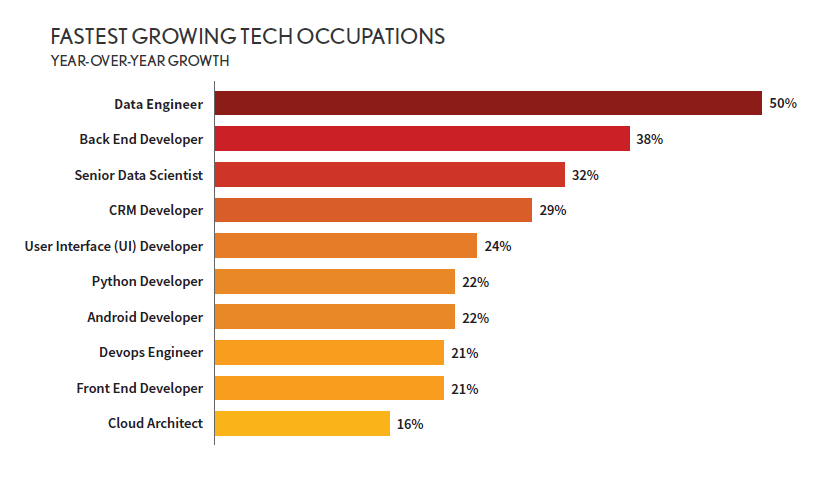
May 17, 2021
Data Engineering Skills & Job Description
Author:

CSO & Co-Founder
Reading time:
14 minutes
Over the past years, we’ve talked about a number of data-related professions. Interestingly, we never talked about data engineers. And that’s what we are going to do today. We want to show you a thorough data engineer job description. We will take a closer look at data engineer’s career paths and required skills. If you want to become a data engineer, this article is your must-have!
Data engineers have a lot in common with data scientists. Just like them, they work on data so that it’s usable from the business intelligence and machine learning point of view. But who exactly is a data engineer? What is their role and career path? And finally, what skills do you need to become one? Let’s get right to it.
Check out our data engineering services.
Data Engineering Skills Explained: The Job Description of a Data Engineer
Shortly put, data engineering is a significant subset of data science. Data engineering teams are responsible for the design, construction, maintenance, extension, and frequently the entire infrastructure that supports data in the company. And as you already know from our previous articles, data science is a vast AI-related field that’s all about making the most of the data that a company processes. Data science also plays a vital role in such fields as:
- Artificial intelligence
- Machine learning
- Business intelligence
- Data analytics
Now, typically, data scientists are focused on exploring data and making the most of it. They analyze data in order to explore it, find useful insights, and turn them into business knowledge. The word scientist is truly in the right place. Just like a scientist in a lab analyzes samples, studies sources, and describes their discoveries, data scientists do the same thing with data.
They are not focused on the technical aspect of it. They are interested in its contents. When it comes to technical aspects of data–you need data engineers. That’s why this role requires a set of technical skills, including thorough knowledge of SQL databases and diverse programming languages, starting with Python, a language that’s extensively used in the AI and data science setup.
Data engineering is all about making data-related algorithms work on a production level. Their algorithms help make raw data more useful to the company. Data engineers are usually a part of the data science teams or departments and work on creating, managing, and developing technological infrastructure that supports data science. This infrastructure is frequently referred to as data platforms.
But it’s not the end of the data engineer’s responsibilities. They are also responsible for developing dashboards, reports, and other data visualization solutions.

We could shortly say that data engineers combine knowledge and skills of computer science, engineering, and database management.
The difference between data engineer and data scientist
The difference between these two professions is not obvious, and it depends on many factors, just to mention the size of the company or type of project. The more complex the project is, the more visible difference between these two professions becomes. Small companies usually employ just data scientists.
Large companies also require data engineers who are typically responsible for architecting, building, testing, and maintaining the data platform as a whole.
If you want to comprehend the difference between data scientists and data engineers, just remember that data engineers are associated with technical aspects of data. In contrast, data scientists focus mostly on subject-related elements of work.

Data Engineering Skills in Action: What a Data Engineer Does
Partly, we’ve already talked about that, but let us be more specific. In fact, the role of a data engineer varies between companies. In large, multinational corporations, their work is limited strictly to technical tasks and assignments. Data scientists and consultants do the whole rest.
In a small data team, the data engineer can also do the job of data scientists. The project our data engineer works on is also not without significance. The more advanced technologies (like deep learning) are involved, the more complex your data platform has to be. As a result, the scope of a data engineer’s work becomes broader.
In general, the main role of a data engineer revolves around three crucial elements:

1. Extracting data
Usually, data engineers start their work by extracting data from various sources into the data platform. These sources can be very variegated, and they comprise CRM systems, Google Analytics, social media platforms, website data, call center logs, and many more elements. Sometimes data we need comes also from public sources like whitepapers and reports.

2. Storing data
Next, the data engineer has to come up with a solution that will allow them to store data in a cleaned and organized way. The most common solution that allows you to store data for AI and BI purposes is a data warehouse. If your data is unstructured and in different formats, you ought to opt for a data lake.

3. Transfroming data
Finally, the data engineer has to transform data so that it can be used in various AI-related projects. Transforming data includes cleaning, structuring, and formatting the datasets to make data within usable for further processing or analysis.

Types of data engineers
Moreover, we should note that the data engineer’s roles and responsibilities depend on their team and project. Suppose our data engineer works in a small team/organization. In that case, they will be most likely responsible for the entire data flow (so-called general-role data engineer), from configuring data sources up to using diverse analytical tools.
In large corporations, things get complicated. For instance, it is possible for a data engineer to work solely on the architecture of a data warehouse (warehouse-centric data engineer). In such a situation, their main concern is with big data tools like Hadoop and integration tools.
And then, there’s the pipeline-centric data engineer. They are focused on data integration and connecting data sources with a data warehouse. Pipeline-centric data engineers usually deal with ETL development.

Crucial data engineer responsibilities
The list of the responsibilities of a data engineer can be very extensive. It usually comprises the following elements:
- Data platform design: It’s the data engineers’ role to design and set a specific data platform that suits the current needs of the company they’re working for.
- Development of the data-related tools and instruments: As we’ve already told you, data engineers work not just with data platforms but with a bunch of related tools and instruments, primarily concerning data analytics and visualization. A decent data engineer should know these tools and use them skillfully to achieve their goals.
- Data infrastructure maintenance: In short, it’s the data engineer that keeps everything data-related intact. That’s why they are responsible for data pipeline maintenance, data warehouse/lake maintenance, and the maintenance of data-related algorithms. Usually, data engineers work closely with data scientists and testing teams. Of course, here, the monitoring of the overall performance and stability of the specific data platform is also indispensable.
- Machine learning algorithms: Data engineers, along with data scientists play a significant role in the development and deployment of ML algorithms. And while data scientists design them and set the objectives that the company wants to achieve, engineers are responsible for building these algorithms and deploying them into the production environment.
- Data and metadata management: It’s data engineers’ responsibility to manage every data source and data storage solution. They keep data up to date and organized. Data engineers also have to deal with metadata (in short data that describes other data) and also keep it intact. In a way, a data engineer could be called a guardian of the data.
- Data access and visualization tools: Frankly, it’s one of the side jobs of a data engineer. Sometimes, it’s not even needed. However, suppose a company requires that non-technical users have access to data (in order to view it, visualize it, and generate reports). In that case, data engineers provide solutions that enable access to data and data-related tools in a safe and efficient manner.
Now you know what a data engineer does, what’s their scope of work, and what types of data engineers are there. Now, let’s talk about the skills and requirements that you have to meet in order to become a successful data engineer.

The skills and requirements to become a data engineer
Since data engineering is a strictly technical area of expertise, you’ll need a lot of technical and engineering skills. For starters, the vast majority of companies looking for data engineers state that they require experience with the following tools and IT solutions:
- Big data tools: Especially Hadoop, Spark, Kafka, etc. You can read more about big data tools on our blog.
- Advanced work experience with relational SQL and NoSQL databases
- Data pipeline and workflow management tools: Here, it’s vital to mention tools like Azkaban, Luigi, and Airflow.
- Cloud services: Especially Amazon AWS and Microsoft Azure
- Stream-processing systems like Storm or Spark-Streaming
- And finally, there are programming languages, primarily Python, Java, C++, and Scala.

Data-related knowledge and experience
Every data engineer needs a deep understanding of data, including data modeling, ML algorithms, data transformation techniques (chiefly the aforementioned ETL process), data storage solutions, and data-related tools. Understanding business intelligence is also considered a significant asset. Bear in mind that data engineers work with data warehouses, data lakes, data management tools, and related platforms and services.
You have to know how to use all these tools and instruments. Concentrate on cloud services and machine learning libraries and frameworks. Moreover, you will need full command of big data technologies, especially Hadoop and Kafka. Experience with BI tools like PowerBI is also appreciated.

Data warehouse knowledge and experience
If you want to work as a data engineer, you have to master data warehouses. You have to know how to design and build a data warehouse (and preferably a data lake as well). You have to master both relational and distributed databases. Again, a knowledge of cloud-based data storage solutions is also of the essence.
In May 2020, Xplenty published a list of the top data warehouse tools. Their list comprises i.a.:
- Amazon Redshift
- Microsoft Azure
- Google BigQuery
- Snowflake
- Micro Focus Vertica
- Teradata
- Amazon DynamoDB
- PostgreSQL
- SAP HANA
- MarkLogic
- Cloudera
Of course, it’s impossible to master all of these tools, but you should know what they are all about and be able to work with at least two-three of the most popular ones.

Education
First off, you’ll need a bachelor’s degree in computer science, software engineering, statistics, or another similar field. Of course, that’s just a starting point. You’ll also need to have perfect command of big data and data analytics. Therefore, additional knowledge and certificates revolving around these fields are more than welcome.
According to CIO[1], there are nine of the top data engineering certifications. We advise you to take a look at them:
- Amazon Web Services (AWS) Certified Data Analytics – Specialty
- Cloudera Certified Associate (CCA) Spark and Hadoop Developer
- Cloudera Certified Professional (CCP): Data Engineer
- Data Science Council of America (DASCA) Associate Big Data Engineer
- Data Science Council of America (DASCA) Senior Big Data Engineer
- Google Professional Data Engineer
- IBM Certified Data Architect – Big Data
- IBM Certified Data Engineer – Big Data
- SAS Certified Big Data Professional
You can also visit Coursera and browse their list of data engineering-related courses and certificates. Some of them are even available for free! The list of online courses you can find on Coursera is, in fact, very long. Surely, you will find some courses that will help you develop your knowledge and skills at the very beginning of your career.
And if you’re looking for free classes (maybe because you’re not yet sure whether this career is for you), take a look at a list provided by MLtut.com. For example, you should find out more about Data Engineering with Google Cloud Professional Certificate.
Again, pursuing all of these certificates at the very beginning of your career is pointless. Start with just one and try to find the first entry-level job. And while we are at the entry-level job, it’s a good moment to tell you something more about the data engineer’s career path:

The data engineer’s career path
According to MasterDataScience.org[2], it’s best for you if you follow this path:
- Get a bachelor’s degree (in one of the fields mentioned above) and begin working on your first projects in an entry-level position.
- Work on your analysis, engineering, and big data skills.
- Try to get additional certifications
- Pursue the master’s degree in computer science or engineering and try to gain a higher position in data engineering
As you can see, the way to become a data engineer is not easy, but once you decide to pursue this career, there are hundreds of opportunities waiting for you.
Today, almost every large company, not to mention AI companies and start-ups, need data engineers. And according to PayScale.com[3], the average data engineers’ base pay exceeds 92,000 USD per year. You can also count on various bonuses (PayScale estimates 2-16k per year) and profit shares (1-27k per year).
In early 2020, there was released a Dice 2020 Tech Job Report[4] and it provides us with valuable insight concerning a data engineer’s career. You have to know that this occupation was indicated as the fastest-growing job in technology in 2019, with a 50% year-over-year growth in the number of open positions:

Source: datanami.com
Interestingly, the same report states that the demand for data science jobs will increase by 38% over the next 10 years, while demand for machine learning jobs will rise by 37% over the same period. This means that there will surely be a job for you in the coming years. In 2019, the percentage demand growth for data engineers was at 45%. Therefore you can only expect to have more and more work.
Summary
Data science is considered a major game-changer in many industries, and companies all over the world begin to realize that. Therefore, they will need more and more data engineers and data scientists in the coming months and years. Sure, becoming a data engineer is no cakewalk. There are at least five years of hard work waiting for you. But we honestly believe that this career is worth every effort. As a data engineer, you will play a significant role in every data-related project. In many instances, you will even have an opportunity to improve people’s lives!
At Addepto, we fully understand the value of a good data engineer. That’s why every year, we’re actively looking for promising candidates to work with us on AI and data-related projects. If you already have some data science experience or data engineering experience, please send your resume to us.
Although we can’t promise you a job, we are always interested in meeting new candidates! And if you’re running a company that needs help with data engineering–we are at your service! We are an experienced data and AI consulting company. We help companies all over the world make the most of the data they process every day. With our help, you will easily improve your data analytics and business intelligence.
Drop us a line and find out more today!
References
[1] Thor Olavsrud, CIO.com, Top 9 data engineer and data architect certifications, Sep 4 2020, https://www.cio.com/article/3395879/top-14-data-engineer-and-data-architect-certifications.html, accessed Maj 14 2021
[2] Masters In Data Science, How to Become a Data Engineer in 2021? https://www.mastersindatascience.org/careers/data-engineer/ June 2020, accessed May 14 2021.
[3] Payscale.com, Average Data Engineer Salary, https://www.payscale.com/research/US/Job=Data_Engineer/Salary, accessed May 14 2021
[4] Alex Woodie, Datanami.com, https://www.datanami.com/2020/02/12/demand-for-data-engineers-up-50/, Feb 12 2020, accessed May 14 2021
Category:




